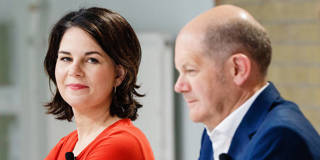Strong performances by the Greens and the Social Democrats in Germany's federal election have made it likely that outgoing Chancellor Angela Merkel's Christian Democrats will be consigned to the opposition. The hope now is that German economic policy will start to look to the future, rather than merely the present.
STANFORD – The Greens’ strong performance in Germany’s federal election – though not as strong as the party hoped just a few short weeks ago – offers hope that the country will now finally start moving in a more promising direction. That may mean moving away from outgoing Chancellor Angela Merkel’s authoritarian-friendly positions, not least her support for the Nord Stream 2 gas pipeline between Germany and Russia, and her championing of an EU investment agreement with China (which has since been blocked by the European Parliament).
Unlike Merkel’s Christian Democratic Union (CDU) and the Social Democratic Party (SPD) – both of which have exhibited a pro-Russian bias ever since Gerhard Schröder’s chancellorship (1998-2005) – the Greens favor tougher policies toward both Russia and China. Moreover, they are now in a position to keep the SPD’s past bias toward Russia in check, since they could join its chancellor candidate, Olaf Scholz, in a new governing coalition that would consign the CDU to the opposition.
During the final television debate of the campaign, Scholz and Annalena Baerbock of the Greens came out in favor of precisely this arrangement. Although forming a new government could be a slow process, and numerous combinations and permutations are possible, the Greens are poised to play a key role in almost all of them. They are the common denominator, and this fact will not have been lost on Russian President Vladimir Putin, whom many Germans believe was active behind the scenes in trying to minimize the Greens’ electoral success.

STANFORD – The Greens’ strong performance in Germany’s federal election – though not as strong as the party hoped just a few short weeks ago – offers hope that the country will now finally start moving in a more promising direction. That may mean moving away from outgoing Chancellor Angela Merkel’s authoritarian-friendly positions, not least her support for the Nord Stream 2 gas pipeline between Germany and Russia, and her championing of an EU investment agreement with China (which has since been blocked by the European Parliament).
Unlike Merkel’s Christian Democratic Union (CDU) and the Social Democratic Party (SPD) – both of which have exhibited a pro-Russian bias ever since Gerhard Schröder’s chancellorship (1998-2005) – the Greens favor tougher policies toward both Russia and China. Moreover, they are now in a position to keep the SPD’s past bias toward Russia in check, since they could join its chancellor candidate, Olaf Scholz, in a new governing coalition that would consign the CDU to the opposition.
During the final television debate of the campaign, Scholz and Annalena Baerbock of the Greens came out in favor of precisely this arrangement. Although forming a new government could be a slow process, and numerous combinations and permutations are possible, the Greens are poised to play a key role in almost all of them. They are the common denominator, and this fact will not have been lost on Russian President Vladimir Putin, whom many Germans believe was active behind the scenes in trying to minimize the Greens’ electoral success.